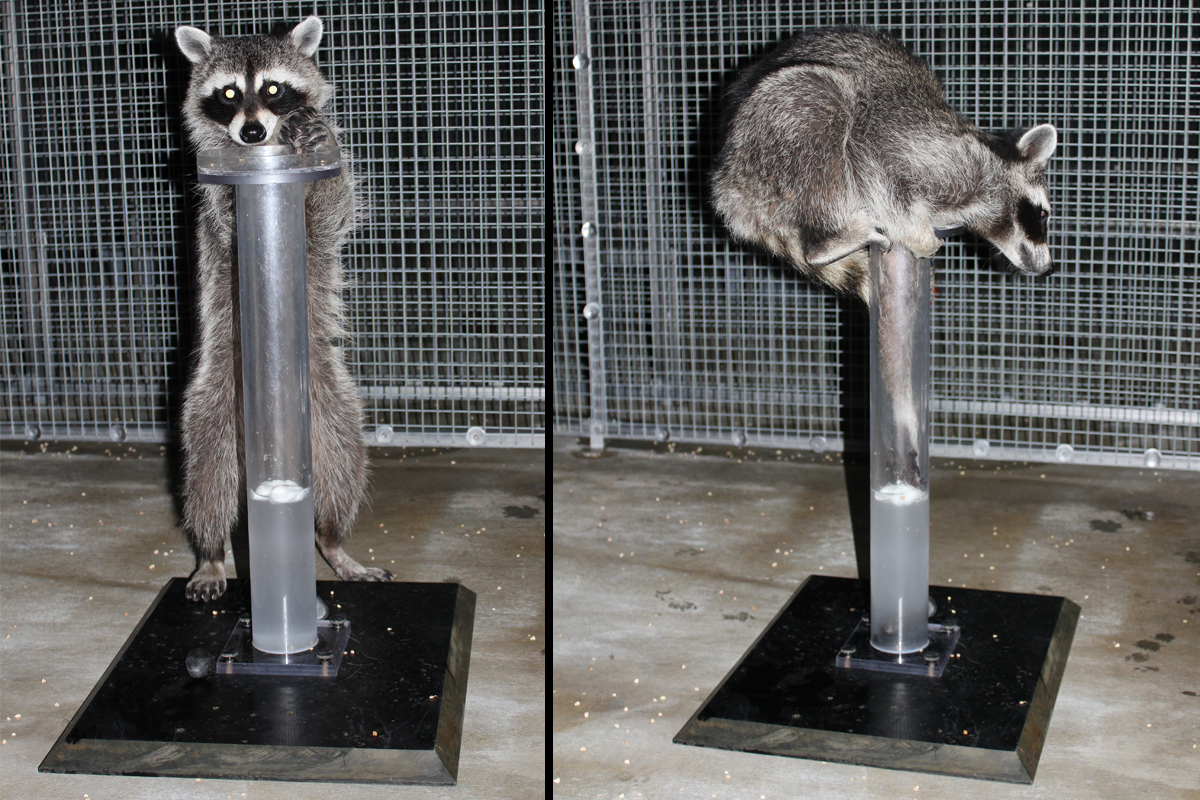Raccoons Ace Cognition Test (But Sometimes They Cheat)
In the classic Aesop tale "The Crow and the Pitcher," a thirsty corvid who can't quite reach the water at the bottom of a jug cleverly drops pebble after pebble into the vessel until the water rises enough for the bird to take a drink.
Researchers have used this "Aesop's fable" scenario in experiments that test cognition in birds and primates. The test helps researchers see if the animals could learn to recognize cause and effect and use that knowledge to solve a problem, as Aesop's crow did.
Recently, scientists turned to raccoons, learning that the wily creatures were not only capable of solving Aesop's problem, but also willing to bend the rules to get their rewards. [The 5 Smartest Non-Primates on the Planet]
Although mammalian carnivores had never previously been tested with these methods, the researchers suspected that raccoons would be good candidates; prior studies had shown that raccoons are creative problem-solvers and are more intelligent than domestic cats, the study authors wrote. Raccoons are also known to have an affinity for water, and were therefore likely to already have an innate understanding of water displacement, study co-author Lauren Stanton, a doctoral candidate with the Program in Ecology at the University of Wyoming, told Live Science in an email.
The study authors trained eight raccoons using cylinders of water and stones of different sizes, with floating marshmallows as the reward. Nearly all of the raccoons were extremely curious and hands-on with the test materials — so much so that the scientists often had to search for missing stones that their subjects had buried in their litter boxes or hidden in the dens where the animals slept, Stanton said. While this behavior sidestepped the experiment, it also demonstrated the raccoons' curiosity, an important component of cognition, the researchers wrote in the study.

Two of the animals learned to drop stones into the liquid to retrieve a marshmallow treat, progressing to the next stage of trials, in which they had to choose among objects of different weights and buoyancies. This was done to see if the animals recognized a connection between weight and water displacement.
"This demonstrated that raccoons are able to innovate solutions to novel problems, sometimes in ways we would not expect," Stanton told Live Science.During the experiments, some of raccoons arrived at unique and unexpected solutions to earn their treats. One enterprising individual climbed atop the heavy tower that held the water, and rocked back and forth until the structure tipped over, the study authors reported. And the two raccoons that worked with buoyant objects figured out that they could repeatedly push down on floating balls to make waves that would splash marshmallow bits within reach.
Sign up for the Live Science daily newsletter now
Get the world’s most fascinating discoveries delivered straight to your inbox.

As only two raccoons completed the task in the manner it was intended, the researchers could form only limited conclusions about raccoon cognition and tool use, Stanton explained. But the findings did highlight the animals' innovation, "which is an important cognitive ability," she said.
"Our study is also a good reminder that when you give a test like Aesop's fable to a new species, you might find that they perform very differently than other animals and put their own spin on it," she added.
In addition, the results suggest Aesop's test could be used to gauge cognition in animals other than birds and primates, Stanton said.
The findings were published in the November issue of the journal Animal Cognition.
Original article on Live Science.

Mindy Weisberger is an editor at Scholastic and a former Live Science channel editor and senior writer. She has reported on general science, covering climate change, paleontology, biology and space. Mindy studied film at Columbia University; prior to Live Science she produced, wrote and directed media for the American Museum of Natural History in New York City. Her videos about dinosaurs, astrophysics, biodiversity and evolution appear in museums and science centers worldwide, earning awards such as the CINE Golden Eagle and the Communicator Award of Excellence. Her writing has also appeared in Scientific American, The Washington Post and How It Works Magazine. Her book "Rise of the Zombie Bugs: The Surprising Science of Parasitic Mind Control" will be published in spring 2025 by Johns Hopkins University Press.









